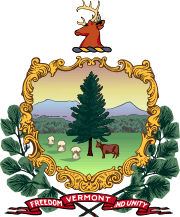Erastus Fairbanks
| Erastus Fairbanks | |
|---|---|
 Erastus Fairbanks | |
| 21st Governor of Vermont | |
|
In office October 1852 – October 1853 | |
| Lieutenant | William C. Kittredge |
| Preceded by | Charles K. Williams |
| Succeeded by | John S. Robinson |
| 26th Governor of Vermont | |
|
In office October 12, 1860 – October 11, 1861 | |
| Lieutenant | Levi Underwood |
| Preceded by | Hiland Hall |
| Succeeded by | Frederick Holbrook |
| Member of the Vermont House of Representatives | |
|
In office 1836-1838 | |
| Personal details | |
| Born |
October 28, 1792 Brimfield, Massachusetts |
| Died |
November 20, 1864 (aged 72) St. Johnsbury, Vermont |
| Political party | Whig |
| Spouse(s) | Lois Crossman |
| Children | Horace Fairbanks, Franklin Fairbanks |
| Profession | manufacturer / politician |
| Religion | Congregationalist |
Erastus Fairbanks (October 28, 1792 – November 20, 1864) was an American manufacturer, Whig politician, a founder of the Republican Party, and the 21st and 26th Governor of Vermont.
Biography
Fairbanks was born in Brimfield, Massachusetts to Phebe (Paddock) Fairbanks (1760-1853) and Joseph Fairbanks (1763-1846). He studied law but abandoned it for mercantile pursuits, and operated a store in Wheelock, Vermont. He married Lois Crossman (1792 - 1866) on May 30, 1815.[1] The couple had eight children.[2]
Career
Finally settling in St. Johnsbury, Vermont, in 1824, Fairbanks formed a partnership, E. & T. Fairbanks & Co., with his brother Thaddeus for the manufacture of scales, stoves and plows. Thaddeus Fairbanks later invented the first platform scale, which made it possible to calculate the weight of farm products and other goods shipped by wagon and railroad car; the device proved so successful that the renamed Fairbanks Scales company became the largest employer in the state.[3]
Fairbanks was a member of the Vermont House of Representatives from 1836 to 1838. He was President of the Passumpsic Railroad, which completed a line from White River to St. Johnsbury in 1850. He was a Presidential Elector for Vermont in 1844 and 1848.
Fairbanks was elected the 21st Governor of Vermont in 1851 and served from 1852 to 1853. During this term, a law was passed forbidding the sale or traffic of intoxicating beverages. The law was not repealed until 1902.[4]
Fairbanks was one of the founders of the Republican Party, and a delegate from Vermont to the first Republican National Convention in 1856.[5] He was 26th Governor of Vermont from 1860 to 1861. During his second term he rendered valuable aid in the equipment and dispatch of troops in the early days of the American Civil War.
Family life
With his brothers Thaddeus and Joseph P., he founded St. Johnsbury Academy. He was the father of Horace Fairbanks and Franklin Fairbanks.[6]
Death
Fairbanks was a Congregationalist. He died in St. Johnsbury, Caledonia County, Vermont, on November 20, 1864 (age 72 years, 23 days). He is interred at Mt. Pleasant Cemetery, St. Johnsbury, Vermont.
References
- ↑ "Erastus Fairbanks". The Political Graveyard. Retrieved 7 November 2012.
- ↑ "Erastus Fairbanks". National Governors Association. Retrieved 7 November 2012.
- ↑ "Erastus Fairbanks". Find A Grave. Retrieved 7 November 2012.
- ↑ "Erastus Fairbanks". National Governors Association. Retrieved 7 November 2012.
- ↑ "Erastus Fairbanks". Find A Grave. Retrieved 7 November 2012.
- ↑ "Erastus Fairbanks". The Political Graveyard. Retrieved 7 November 2012.
Further reading
- Fairbanks, Lorenzo Sayles, Genealogy of the Fairbanks Family in America 1633–1897, Boston, 1897.
- Inventory of the Erastus Fairbanks Papers, Special Collections, University of Vermont Library
External links
| Wikimedia Commons has media related to Erastus Fairbanks. |
- Ancestry.com
- Fairbanks Museum in St. Johnsbury, Vermont
- The Political Graveyard
- National Governors Association
- Find A Grave
 This article incorporates text from a publication now in the public domain: Chisholm, Hugh, ed. (1911). "article name needed". Encyclopædia Britannica (11th ed.). Cambridge University Press.
This article incorporates text from a publication now in the public domain: Chisholm, Hugh, ed. (1911). "article name needed". Encyclopædia Britannica (11th ed.). Cambridge University Press.
| Political offices | ||
|---|---|---|
| Preceded by Charles K. Williams |
Governor of Vermont 1852–1853 |
Succeeded by John S. Robinson |
| Preceded by Hiland Hall |
Governor of Vermont 1860–1861 |
Succeeded by Frederick Holbrook |
